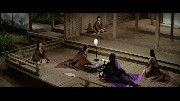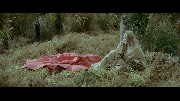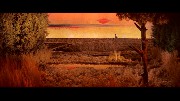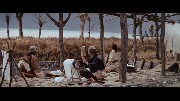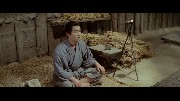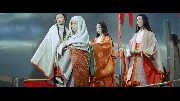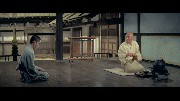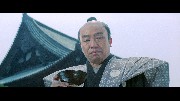Kaidan / Kwaidan (1964) 2 x DVD and Blu-Ray Criterion Collection
on October 31st, 2018 at 22:19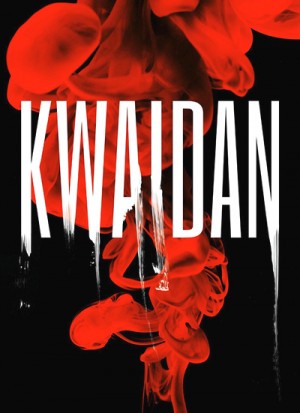
A twisted path led to the creation of Kwaidan, an unforgettable collection of four ghost stories from director Masaki Kobayashi. A pacifist who saw the worst of WWII from the front, Kobayashi had received acclaim for his sprawling trilogy The Human Condition when he chose to turn to period films, first with Harakiri and then with 1964's mammoth Kwaidan, an adaptation of folktales drawn from Lafcadio Hearn's turn-of-the-century stories. A journalist from America by way of Dublin and Greece, Hearn began covering Asia in the late 19th century. After falling in love with Japan and marrying a Japanese woman, Hearn adopted the name Koisumi Yakumo and began writing about Japanese customs and adapting Japanese folktales to widespread popularity both internationally and in his adopted homeland. Readers particularly admired his ghost stories, paving the way for this large-scale 1964 adaptation.
Using stylized sets, bold color schemes, and languorous, lingering direction, Kobayashi weaves supernatural tales both creepy and profound, eerie stories that also explore the relationships between men and women, the subject of justice, and the pull of history.
This release of Kwaidan features a new restoration and reconstruction of the 183-version of the film with the original four stories. When the film was initially cut for the Cannes screening, the entire second story, "The Woman of the Snow", was removed.

Director: Masaki Kobayashi
Cast: Rentaro Mikuni, Michiyo Aratama, Misako Watanabe, Tatsuya Nakadai
Country: Japan
Genre: Drama, Fantasy, Horror
The first of the four stories that makes up the whole of the film is Black Hair. Here we learn the story of a poor samurai (Rentaro Mikuni) who divorces his wife (Michiyo Aratama) and leaves town. Now free, he remarries another woman (Misako Watanabe) out of love but for her money. Not so surprisingly, this second marriage fails quite quickly and our samurai soon finds himself longing for his first wife. He returns to her but when he does, it doesn't take him long to realize that something has changed and that she's not quite the same as she once was.
In The Woman In The Snow We follow a woodcutter (Tatsuya Nakadai) as he takes shelter from a terrible snowstorm. When he does, he witnesses a strange female ghost kill his older travel companion. His life is spared on the condition that he not speak of this but decades later when he falls in love with a strange and mysterious woman, his past comes back to haunt him.
The third story, Hoichi The Earless, follows the titular Hoichi (Katsuo Nakamura), a blind musician who lives a strange life in a monastery where his music attracts the attention of a high court made up of spirits (one of whom is Tetsuro Tanba). So impressed are they with his music that they demand he come up with a song suitable for representing the battle that wound up taking their lives for them. Communicating with the ghosts is having a harsh effect on Hoichi's life, however, and so the monks who he lives with (led by Takashi Shimura) decide to cover his body in a scripture that should ward off the spirits… if it's done properly.
The fourth and final story is In A Cup Of Tea. Here a writer tells the story of a man that sees a strange face reflected in his cup of tea, but there's more to it than that and as the story plays out the connection to the man drinking the tea and the reflection he sees is more very clear indeed.
BD50 + 2xDVD | 1080p AVC, NTSC | 03:03:15 | 44.7 Gb + 11 Gb + 3% rec
Language: Japanese
Subtitles: English
Extras:
• Commentary - in this brand new audio commentary, film scholar Stephen Prince, author of The Warrior's Camera, discusses Masaki Kobayashi's political orientation and body of work, Kwaidan and how it differs from the rest of the director's films, the importance of Toru Takemitsu's minimalistic soundtrack as well John Cage's influence on his work, the unique sets/lighting and use of color, the film's financing, some of the key differences between the shorter and longer versions of the film, etc. The commentary was recorded exclusively for Criterion in 2015.
• Masaki Kobayashi - presented here is an archival conversation between director Masaki Kobayashi and filmmaker Masahiro Shinoda, which was shot in 1993 for the Director's Guild of Japan. The bulk of the comments address the funding and rather difficult production history of Kwaidan, the film's reception in Japan and Europe, the structure of its narrative, some specific stylistic choices that were made during the production process, and select themes from the four stories. In Japanese, with optional English subtitles. (16 min, 1080i).
• Kioshi Ogasawara - in this brand new video interview, Kyoshi Ogasawara, assistant director on Kwaidan, recalls how he became involved with the project, and discusses Yoko Mizuki's script and the important themes in the four stories from Lafcadio Hearn's novel, the tonalities and color schemes seen in the film, Masaki Kobayashi's working methods and his professional relationship with Toru Takemitsu, the unusual balance between silence and sound in the soundtrack he created for the film, etc. Kioshi Ogasawara also explains why Masaki Kobayashi always considered the 183-minute version of Kwaidan to be its definitive version and how it was miraculously saved and restored after the director passed away. (For a number of reasons, the film had to be cut when it was submitted for consideration at the Cannes Film Festival. However, later on the shorter 161-minute version became the only version that was also distributed in various international markets). The interview was conducted exclusively for Criterion in 2015. In Japanese, with optional English subtitles. (22 mini, 1080p).
• Lafcadio Hearn - in this new featurette, English literature scholar Christopher Benfey, editor of Lafcadio Hearn: American Writings, discusses Lafcadio Hearn's life (and specifically his time in New Orleans and Japan), his writings, and Kwaidan: Stories and Studies of Strange Things and some of the key themes in it. The featurette was produced exclusively for Criterion in 2015. In English, not subtitled. (18 min, 1080p).
• Trailers - three original trailers for Kwaidan.
1. Black-and-White Trailer. In Japanese, with optional English subtitles. (2 min, 1080p).
2. Color Trailer 1. In Japanese, with optional English subtitles. (2 min, 1080p).
3. Color Trailer 2. In Japanese, with optional English subtitles. (4 min, 1080p).
upstore
Kwaidan.1964.CC.BluRay.L.part01.rar
Kwaidan.1964.CC.BluRay.L.part02.rar
Kwaidan.1964.CC.BluRay.L.part03.rar
Kwaidan.1964.CC.BluRay.L.part04.rar
Kwaidan.1964.CC.BluRay.L.part05.rar
Kwaidan.1964.CC.BluRay.L.part06.rar
Kwaidan.1964.CC.BluRay.L.part07.rar
Kwaidan.1964.CC.BluRay.L.part08.rar
Kwaidan.1964.CC.BluRay.L.part09.rar
Kwaidan.1964.CC.BluRay.L.part10.rar
Kwaidan.1964.CC.DVD1.L.part1.rar
Kwaidan.1964.CC.DVD1.L.part2.rar
